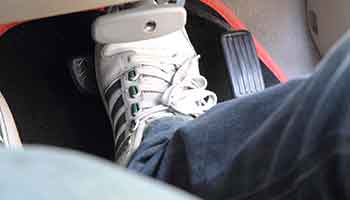
With the summer heat going away, we trade in rain for potential ice and snow. A driver is in complete control of their vehicle, but they cannot control the forces of nature. However, there are steps to take to reduce the amount of accidents that the cold seasons can bring to drivers. If you were injured in a car accident, you may want to contact a Providence car accident lawyer.
What Should I NOT Do On Ice & Snow Covered Roads?
- Do Not Slam On Your Breaks – It is instinctual to hit the brakes before a potential accident occurs. However, on ice and snow covered roads, this is one of the worst things to do. Slamming on the brakes makes the vehicle swerve due to low or no traction from the tires. With tire friction gone, the vehicle is susceptible to fish tailing, spinning the rear of your car around, and other dangerous situations.
- Do Not Travel Down Steep Hills – For the same reason as not slamming on your brakes, a steep hill forces the driver to coast or ride with the brakes engaged. With downward momentum carrying you on ice and snow covered roads, it becomes far more difficult to stop the vehicle than if you were on an even surface.
- Do Not Lose Momentum Traveling Uphill – If you must go on a road that travels uphill, do not come to a complete stop unless the situation absolutely calls for it. By coming to a complete stop, and then trying to accelerate again, you will find your tires can not find traction again and you will likely end up sliding downhill. If there are drivers behind you, you will more than likely collide with them.
- Do Not Drive Too Close Behind The Vehicle In Front of You – As a safe driver, you want to give yourself space and time to react to the traffic around you. If you are within inches of a vehicle in ice and snow covered roads, you are far more likely to crash into them than if you gave the space of 2-3 vehicle lengths.

What Should I Do On Ice & Snow Covered Roads?
- Pump Your Brakes – If you find you are losing control of the vehicle, instead of slamming on your brakes, give your brakes some healthy, repetitive taps, until the vehicle slows to the point that you can come to a complete stop. Doing this reduces the chances of losing traction. If you are still in control of the vehicle’s movements, a slow, easing down on the brakes produces the same, safe results.
- Plan An Alternate Route – Some streets could be slicker than others. This can be especially true for backroads that do not have a snow plow come as quickly as the more traveled main roads. Calling friends who live in other areas can give you an idea as to how bad the roads are in their neck of the woods. Watch the local news to see if any accidents have occurred that would hinder traffic. Also, most GPS navigation tools have traffic notifications that can come in handy.
- Invest In Winter Tires – The treads on winter tires are more abundant than all-season tires and can get a bigger bite for traction on the road. Additionally, the treads are shaped in a way that is more conducive for winter road driving. Winter tires do cost more than regular all-season tires, but for a driver who lives where snow is a likely possibility, it is a worthy investment.
- Turn AWD On – All-wheel drive (AWD) allows the vehicle to provide power to all four tires, which provides added stopping and traction power. If your vehicle is blocked in by snow, AWD may have the power to get you out easier than other modes. It is important to note, however, that AWD is not standard in all vehicles. Check your vehicles manual to see if this is an available feature.
- Stay Home – This is the safest option if at all possible. Outside of work or emergencies, biding your time indoors keeps you fully protected from the hazardous conditions plaguing the roads. Venture out once the roads are adequately cleared.

Contact An Experienced Providence Car Accident Lawyer Today!
 If you or someone you know has been injured in a car accident, contact one of our experienced Providence car accident lawyers. You may be entitled to compensation for medical expenses, lost wages and pain and suffering, among other losses. Call us today toll-free 24/7 at (401) 831-8600 or fill out an online contact form for a free (no obligation) case evaluation.
If you or someone you know has been injured in a car accident, contact one of our experienced Providence car accident lawyers. You may be entitled to compensation for medical expenses, lost wages and pain and suffering, among other losses. Call us today toll-free 24/7 at (401) 831-8600 or fill out an online contact form for a free (no obligation) case evaluation.


